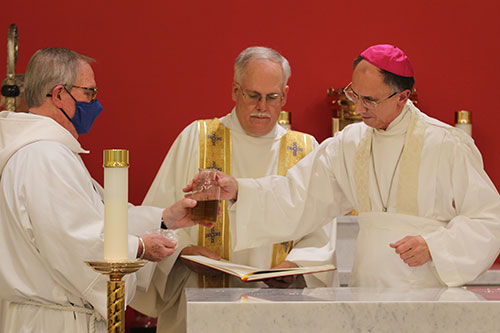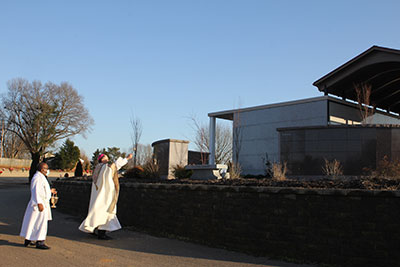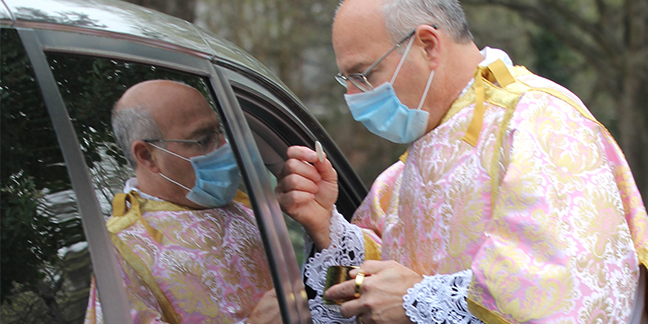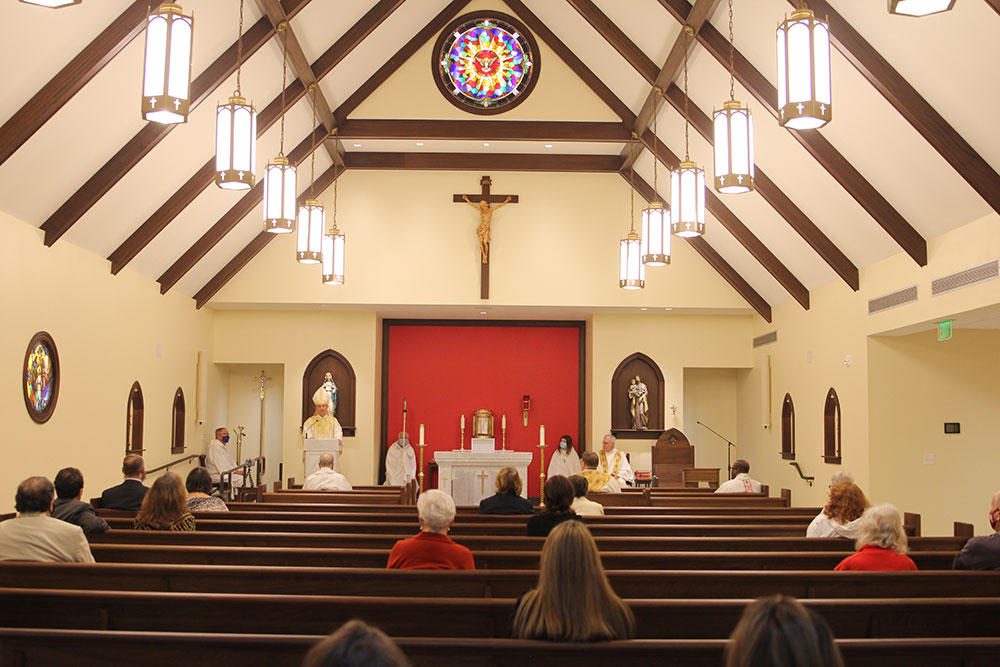Marvelously transformed
CLEMMONS — Parishioners at Holy Family Church celebrated a long-awaited milestone Jan. 27, with the blessing of their new chapel and cemetery.
Bishop Peter Jugis led the ceremonies at the parish to open the 130-seat chapel and bless a new Catholic burial section and columbarium at Westlawn Gardens of Memory cemetery in Clemmons.
The new 2,040-square-foot chapel is what parishioners consider the “crowning jewel” in a series of improvements at the parish’s Bishop William G. Curlin Center, adjacent to the main church.
During the Mass, Bishop Jugis blessed the chapel, its sanctuary and new altar with holy water and consecrated the altar with sacred chrism. He then lit incense in a bowl placed upon the altar during the sacred rite of consecration. Two parishioners then prepared the altar with white linen cloths for the celebration of the Mass.
 In his homily, Bishop Jugis commended parishioners’ efforts and remarked how the space had been “marvelously transformed into a thing of beauty to give honor and glory to Almighty God, so as to worship God in this holy space.”
In his homily, Bishop Jugis commended parishioners’ efforts and remarked how the space had been “marvelously transformed into a thing of beauty to give honor and glory to Almighty God, so as to worship God in this holy space.”
He noted that the newly consecrated altar exists to offer the Holy Sacrifice of the Mass, just as Jesus Christ commanded to be perpetuated as a living memorial until He comes again.
“A sacrifice needs an altar,” he explained. “When we come to Mass, we are offering the sacrifice of Christ for the salvation of the world – and for our own salvation, and for the intentions that we bring to Mass.”
At the conclusion of Holy Communion, the Blessed Sacrament was placed in the chapel’s original tabernacle and the adjacent sanctuary lamp was lit – signifying that Christ was now present.
Concelebrating at the Mass were Father James Stuhrenberg, pastor; Father Peter Nouck, parochial vicar; and former pastor Father Michael Buttner. Deacon John Harrison assisted.
At the conclusion of Mass, Bishop Peter Jugis performed the official Rite of Installation of a Pastor for Father Stuhrenberg, who was assigned as pastor of the parish last July following Father Buttner’s retirement.
Deacon Harrison served as project leader for the Curlin Center renovation. He noted, “The new chapel will be a great addition for our parish. It will provide a quiet and more intimate space for prayer, Eucharistic Adoration, small funerals and weddings, weekday Masses and more.”
When the present church was built and dedicated in 2005, Holy Family’s first church was converted into a multi-purpose facility and renamed in honor of Charlotte’s third bishop.
“However, for many years it was just a big windowless room with chairs,” Deacon Harrison explained. “We used it for some faith formation activities, meetings and office space, but, due to the lack of separation walls, the 4,600-square-foot room was quite noisy and not an efficient use of the space.
Therefore, it was very much underutilized.”
The parish developed a plan to renovate the Curlin Center using its portion of the Diocese of Charlotte’s “Forward in Faith, Hope, and Love” campaign funding. Parishioners wanted to renovate the under-used space into a chapel, two classrooms and a library/meeting room, three faith formation/ministry offices, a faith formation workroom and a storage space. “This space provides a beautiful chapel for prayer, much-needed meeting rooms, and offices,” Father Stuhrenberg said. “The staff seems really happy with their new offices. I appreciate everyone who donated to this project, especially given the challenges posed by COVID-19.”
“This space provides a beautiful chapel for prayer, much-needed meeting rooms, and offices,” Father Stuhrenberg said. “The staff seems really happy with their new offices. I appreciate everyone who donated to this project, especially given the challenges posed by COVID-19.”
To fund the $723,00 renovation, the parish used $300,000 from its FFHL campaign proceeds and conducted a parish capital campaign from 2019 to 2020 to raise the remaining $423,000 for the project.
The renovation work began in July 2020 and was completed in January.
To cap off the events of Jan. 27, Bishop Jugis, Father Stuhrenberg, Father Nouck and Deacon Harrison traveled to nearby Westlawn Gardens of Memory to bless a new Catholic cemetery area with 336 plots and a columbarium with 160 niches.
“This project was started and planned under the leadership of Father Buttner as pastor, and I am glad to inherit the fruit of the work. The team did a really great job,” Father Stuhrenberg said.
“It was so wonderful to have our bishop come and dedicate the altar. Bishop Jugis mentioned how this small chapel here, which seats 130 people, is bigger than many of the churches in the diocese. How blessed we are!” he added.
— Story and photos by SueAnn Howell, senior reporter
Diocese counters report: Paycheck Protection funds were lifeline
 CHARLOTTE — Dioceses across the country, including the Diocese of Charlotte, are refuting an Associated Press report they say erroneously asserts that dioceses had millions of dollars “available” when the pandemic hit and did not need help from the federal Paycheck Protection Program.
CHARLOTTE — Dioceses across the country, including the Diocese of Charlotte, are refuting an Associated Press report they say erroneously asserts that dioceses had millions of dollars “available” when the pandemic hit and did not need help from the federal Paycheck Protection Program.
Created by Congress last spring to keep people employed during the pandemic, the Paycheck Protection Program offered forgivable loans to businesses, nonprofits and churches with fewer than 500 employees that needed help covering the cost of salaries as the economy shut down.
The Diocese of Charlotte is comprised of more than 100 separate Catholic entities – all separate employers with separate finances and administrations – including parishes, schools and other ministries across the western half of North Carolina. About half of those entities qualified, applied and were approved for Paycheck Protection loans in 2020 – which helped keep more than 1,000 workers, teachers and counselors fully employed and insured after the lockdown last March.
Overall, 56 entities across the diocese received Paycheck Protection funding totaling about $8 million, which had to be spent on payroll, mortgage or rent, and utility costs. Loan amounts were prescribed by the Paycheck Protection Program, overseen by the Small Business Administration. On average, parishes received $72,180, and several ultimately were able to return some of the funding as parishioners and donors responded to help the Church weather the downturn.
“When the pandemic hit and churches were forced to close, offertory and other income fell dramatically, as it did for businesses and organizations nationwide,” said Bill Weldon, the diocese’s CFO. “Without this assistance, our parishes, schools and ministries would have had to consider layoffs, furloughs and pay cuts – the very impacts the Paycheck Protection Program was designed to help employers avoid.”
Instead, the various Church entities found new ways to provide comfort throughout the pandemic – through livestreamed, outdoor and other safe religious services, and essential programs such as in-person education, emergency food and utility assistance, mental health counseling and spiritual guidance, and the provision of sacraments such as baptisms and last rites.
A Feb. 4 Associated Press article questioned whether dioceses really needed the Paycheck Protection funding. The story, Weldon said, erroneously claimed the Charlotte diocese “had roughly $100 million available” last spring – a number the AP cobbled together by adding the diocese’s liquid assets with funds that are donor restricted, designated for specific purposes, and owned by the 100-plus Catholic entities in separate savings accounts.
“The AP story mischaracterizes the financial picture of the Diocese of Charlotte,” said Weldon. “It vastly overstates our available assets, ignores current financial liabilities and erroneously suggests that restricted donations and funds designated for specific purposes could have been diverted to cover payroll, rent and utilities. The story also conflates assets owned and controlled by more than 100 separate entities within the diocese, suggesting these separate funds make up one large account for anybody to use. This is simply not true.”
Citing the diocese’s independently audited June 30, 2020 financial statements, Weldon noted that, excluding parishes which report separately to their parishioners, the diocese actually had financial assets available for general expenditures (after subtracting current liabilities) of about $9 million – which equates to only six weeks of operations. Parishes and schools had access only to their own savings, which varied widely.
Immaculate Conception Church in Hendersonville cut expenses substantially and leaned on its savings when the pandemic hit, as income dropped 40 percent in May 2020 compared to the prior year. Despite slashing non-essential expenses, projections showed the parish could not sustain its payroll expenses as revenue continued to diminish.
As recommended by the parish’s finance council, Immaculate Conception’s pastor Father Christian Cook applied for a forgivable Paycheck Protection loan and received $284,000 in funding, which helped meet salary expenses and kept staff working through the summer. Yet as the pandemic dragged on and income failed to recover, it became clear staffing could not be sustained at its pre-pandemic level.
“We kept hoping we might come out of it, and that things might start getting back to normal,” Father Cook said. “While the PPP loan was a blessing, and we were able to maintain full staffing to serve our parish for quite some time despite reduced income, we reached a point where we could no longer sustain the expenses associated with full staffing levels. It was a heartbreaking decision to have to eliminate positions here at Immaculate Conception, but we were left with no other choice.”
Weldon said it would have been unethical to divert money from designated purposes such as employees’ health insurance, pensions or school programs to cover salaries, as suggested in the AP report.
“This would be like shifting money parents pay in fees for school construction to cover salaries at the central office of the diocese, or taking a parish’s hard-earned savings that are set aside for a new parish hall or youth program to pay for another ministry’s rent and utilities,” Weldon said. “Our donors and parishioners rightfully expect that we will honor the purpose for which funds are given to our parishes, schools and ministries.
“As trusted stewards of the funds generously given to us, we take very seriously our responsibility to ensure that internal controls are in place to safeguard assets, ensure all financial activity is accounted for properly, and that all funds received from donors and other constituents are used in accordance with their intentions.”
Many parishes’ savings are modest or donor-restricted, he said, so the Paycheck Protection funds provided a crucial lifeline when offertory collections – parishes’ primary source of income – fell off an average of 21% with the sudden shutdown. Many smaller and rural parishes saw much steeper declines, and at year end, almost one-third of parishes reported their fourth-quarter offertory remained down 30% or more.
As separate employers, each of the 92 parishes and missions, 19 schools and other ministries in the diocese had to evaluate – in consultation with their finance councils – whether they met the criteria to qualify for Paycheck Protection and then decide whether to apply.
Overall, 45 parishes received assistance ranging from $8,025 to $334,784.
Nine schools got loans totaling $2,885,734 to pay teachers and staff: Asheville Catholic, Bishop McGuinness, Immaculate Heart of Mary, Our Lady of Grace, Our Lady of Mercy, Sacred Heart, St. Leo, St. Michael and St. Pius X.
Catholic Charities received $629,109 in funding to keep staff employed. They were able to continue providing vital support with food pantries, counseling services, legal immigration services, family enrichment and more.
The diocese’s central office received $1,550,103 to pay salaries of administrative support staff that serve all of the parishes, schools and agencies across the diocese – including accounting, planning, development, technology, tribunal, legal and human resources staffs.
“Nearly a year later, while funding remains tight, most of our parishes, schools and ministries are on the road to recovery financially from the worst effects of last spring’s economic shutdown,” Weldon said. “Thanks to the generosity of parishioners and donors, the Church has been able to weather the immediate worst effects of the pandemic and remain a beacon of hope throughout this dark and uncertain period.”
— Patricia L. Guilfoyle, Editor




























